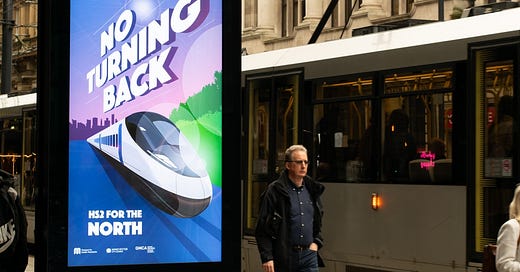Reassessing HS2: Is the London to Birmingham Route Still Viable?
Examining the DfT's assumptions behind the continuation of HS2
High-Speed 2 (HS2) was a planned high-speed railway project in the United Kingdom, linking London, Birmingham, the East Midlands, Leeds, Sheffield, and Manchester. The aim was improve transport links and support economic growth across these areas. However, out of control cost increases have led to cancellation of significant parts of the planned route. Only the London to Birmingham section remains, and even then does not connect to central London and has reduced service levels. The question now has to be asked: should the project be cancelled entirely - including abandoning the works already completed?
In April 2020, Phase 1 of the HS2 programme, stretching from London to Birmingham, received 'Notice to Proceed' (NTP), a critical point of no return. Phase 1 promised a financial Benefits to Cost Ratio (BCR) of 1.2, suggesting that every £1 spent would generate £1.20 in benefits. However, a BCR of 1.2 is considered 'Low' value for money (VfM) by the Government (see other article on VfM).
Typically, projects with low VfM ratings are not approved based on financial metrics alone. The initial approval of Phase 1 depended on broader 'strategic' benefits such as economic 'levelling up' and being an 'engine for growth'. However, with the cancellation of route sections to Crewe, Manchester, and Leeds, these strategic justifications have collapsed, meaning only a financial justification can be considered.
‘The previously stated strategic case for HS2 – to generate transformational benefits and rebalance the economy by joining the North and Midlands with London – no longer applies.’
Advice from Department for Transport to the Public Accounts Committee. 4th October, 2023
The 2020 BCR calculations were based on a Phase 1 project cost estimate range of £35bn to £45bn1. If costs increase the BCR will reduce. In November last year the publicly stated project cost estimate jumped to £45bn to £57bn. Surprisingly the BCR did not fall, instead Parliament were advised that the BCR had risen to a range 1.2 to 1.8 – how can this be?
The BCR calculation used to justify ongoing investment in Phase 1 is not based on the total cost of the project as might be expected. Instead, it is based on the difference in costs between continuing or cancelling the project; money spent to date is excluded from the calculation. This is basically a sound way to frame a question on whether to proceed or cancel a partially completed project. However, in making this assessment cancellation costs can be a critical consideration.
The DfT have used cancellation costs of £11bn, described as ‘remediation’. Remediation in this context entails reversing the work that has been done, for instance dismantling bridges or digging up tunnels that have been constructed and backfilling with earth. There is very little in the way of explanation or substantiation of this amount, and certainly no challenge.
Is it reasonable to assume that if the project were cancelled that full remediation would take place? Is it not more likely that the assets would be mothballed or repurposed? (even if this required a policy change). For instance tunnels could be sealed off; potentially so that the project could be restarted at a future time when construction costs are lower. Some experts suggest that expected advances in AI, Robotics and Energy Generation could lead to a transformative reduction in construction costs.
For the BCR calculation the DfT have published no sensitivity analysis or testing of the £11bn assumed cancellation costs. If mothballing costs were £1bn then the financial case for continuing with Phase 1 collapses. With cancellation costs of £7bn, returns would likely still be less than the investment.
Of course an obvious question is what is the overall BCR for Phase 1 including the money already spent? If we knew what we know now in April 2020 would the project go ahead?
When questioned on this Dame Bernadette, most senior civil servant in the Department for Transport, admitted that the costs of Phase 1 will outstrip the benefits:
“if you step back, as it were, and look at the totality of benefits and of costs as if you were starting on day 1 with phase 1, it would not achieve value for money”
Dame Bernadette Kelly, in Oral Evidence 16th November, 2023
Notes and Links
All costs are in 2019 monetary base.
High Speed 2 (HS2) Phase One Notice-to-Proceed: accounting officer assessment (April 2020)
Continuing investment in HS2 Phase 1: accounting officer assessment (October 2023)
DfT Letter from Bernadette Kelly to PAC, 4th October 2023
Public Accounts Committee Transcript - 16th November, 2023
£35,000,000,000 to £45,000,000,000 - thirty five thousand million pounds to forty five thousand million pounds




